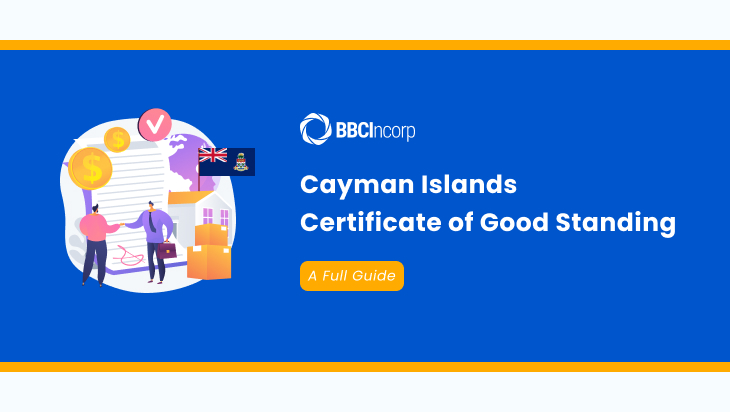
Table of Contents
A Cayman Islands Certificate of Good Standing is an official document issued by the Registrar of Companies that confirms a company’s legal status and compliance with local laws. This certificate is especially important for businesses engaged in international transactions, banking, or regulatory procedures, as it provides proof of the company’s good legal standing.
Whether opening a foreign bank account, entering into cross-border agreements, or complying with due diligence requirements, possessing a valid Cayman Islands Certificate of Good Standing can be essential. In this post, we’ll cover what it is, why it matters, and how to obtain one efficiently.
What is a certificate of good standing in the Cayman Islands?
A Cayman Islands Certificate of Good Standing is a formal document issued by the Cayman Islands Registrar of Companies (under the General Registry, Ministry of Financial Services) confirming that a company is legally registered and fully compliant with local corporate obligations. Essentially, this certificate confirms that a company exists in the jurisdiction, is in “good standing,” and is authorized to conduct business under Cayman law.
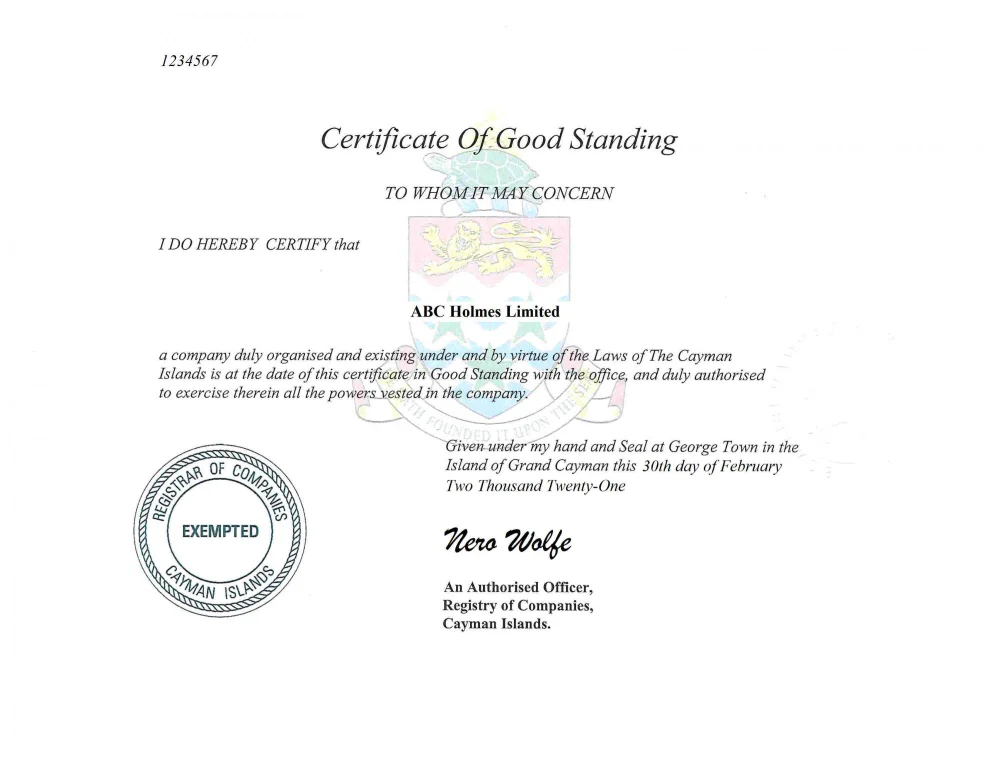
Certificate of Good Standing in the Cayman Island
A typical certificate of good standing Cayman Islands will display the following key details:
- Legal company name
- Official registration number
- Date of incorporation
- Current legal status (“in good standing”)
- Confirmation that annual filings and fees are up to date
- A unique authorisation code or stamp validating its authenticity
Depending on the provider or portal, you may see it referred to as a certificate of existence, certificate of status, or more specifically the corporate certificate of good standing, but all carry the same legal weight in confirming compliance status
The Cayman Islands certificate of good standing differs from other corporate documents in several key ways.
While a certificate of incorporation confirms that a company has been legally formed, it does not verify the company’s current compliance or legal status. Similarly, a tax clearance certificate, which is more common in jurisdictions with direct taxation, confirms tax compliance but is not typically issued in the Cayman Islands due to its tax-neutral environment.
In contrast, the certificate of good standing Cayman Islands provides up-to-date confirmation that a company is not only registered but also fully compliant with its statutory obligations, including annual filings and fees. This makes it a more comprehensive and internationally recognized document for demonstrating a company’s legal and operational status.
Legally, the certificate attains its authority from being issued by the Cayman Islands General Registry, which operates under the Ministry of Financial Services through the Registrar of Companies. The registry’s authentication system includes authorization codes and online validation, which further reinforces the document’s credibility and legal weight.
By providing official confirmation of a company’s status, the certificate of good standing Cayman Islands is widely accepted by banks, investors, regulators, and counterparties in international business, due diligence, and regulatory processes. It is a key document for any Cayman Islands corporation seeking to prove its legitimacy and reliability in global markets.
Who needs a certificate of good standing in the Cayman Islands?
Businesses and legal entities often require a certificate of good standing Cayman Islands to verify their compliance and operational legitimacy under Cayman law. This document also serves as essential proof for Cayman Islands certificate of good standing verification, and is most commonly needed in the following scenarios:
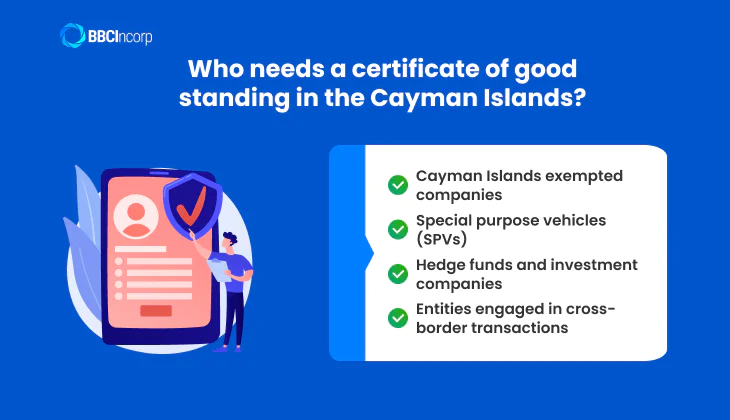
- Cayman Islands exempted companies, the most popular offshore vehicle for international business, especially in asset finance and SPV structures. These companies must demonstrate ongoing compliance for financing, listings, or licensing purposes.
- Special purpose vehicles (SPVs), including Segregated Portfolio Companies, especially when structured for securitizations or collateralized loan obligations. Lenders, trustees, and investors often require proof of legal existence and regulatory compliance.
- Hedge funds and investment companies, which operate primarily through exempted companies or SPCs in the Cayman Islands. Fund administrators, custodians, and regulators generally request a Cayman Islands company certificate of good standing during due diligence or licensing processes.
- Entities engaged in cross-border transactions, including holding companies, joint ventures, financing structures, or global trade operations. A business certificate of good standing helps reassure international banks, law firms, and regulatory bodies of the entity’s current legal status and compliance.
International banks frequently request the document to open corporate accounts. Law firms use it for client onboarding and transaction closing. Regulators rely on it to confirm eligibility for engaging in regulated activities.
Maintaining this certificate supports a company’s offshore reputation and operational capability—essential in jurisdictions where regulatory transparency is scrutinized. Furthermore, it’s a mark of credibility in financial markets.
It is important to note that sole proprietors and unregistered partnerships in the Cayman Islands are generally not eligible. Only registered legal entities such as exempted companies or Cayman Island LLCs can apply. The fee for obtaining one is modest—US $125 for online and government-processed certificates—and may include additional costs for expedited processing.
Ensuring you have a current certificate of good standing is a small investment that can significantly strengthen your standing in the global business community.
When and why is it required?
Understanding when and why a corporate certificate of good standing is required is essential for any company operating out of the Cayman Islands, especially those engaging in international business or regulated activities.
Common use cases for a good standing certificate
One of the most common use cases is opening international bank accounts. Many global banks require companies, particularly those incorporated more than a year ago, to provide a valid statement of good standing before they will proceed with account approval.
Regulatory audits follow the same principle—auditors and regulators use this certificate to verify legal compliance and ensure the entity remains in good standing.
When registering subsidiaries or branches in other countries, foreign authorities almost always request a statement of good standing from the parent Cayman company.
During mergers, acquisitions, or corporate restructuring, buyers and legal advisors require this certificate to confirm that the company is legally valid and without restrictions.
It may also be needed during the renewal of business licenses or trade certificates, especially when local authorities require current legal verification.
Additionally, companies looking to participate in tenders or government contracts, particularly those with higher thresholds or international implications, will often need to present this certificate as part of the eligibility criteria.
Consequences of not having a certificate of good standing
Not having a valid certificate of good standing can lead to significant consequences. These include reputational damage and legal complications, particularly if stakeholders interpret the absence of the document as a sign of non-compliance.
Applications for banking services or business licensing may be denied, and the company risks being flagged by the Cayman Islands Registrar of Companies as non-compliant or inactive.
This can cause delays in major transactions or even prevent a company from proceeding with international agreements.
In short, if you are asking, “do I need a certificate of good standing?”, the answer is frequently yes. This document is a key component of your company’s legal and operational credibility. For activities such as international banking, expansion, licensing, or corporate transactions, a valid Cayman Islands certificate of good standing is often a critical requirement.
How to obtain a certificate of good standing in the Cayman Islands
If you’re considering obtaining a certificate of good standing Cayman Islands, here is what you need to know about the application process and requirements.
Step-by-step application process
Applying for a certificate of good standing in the Cayman Islands involves a straightforward administrative process. Here are the key steps to follow:
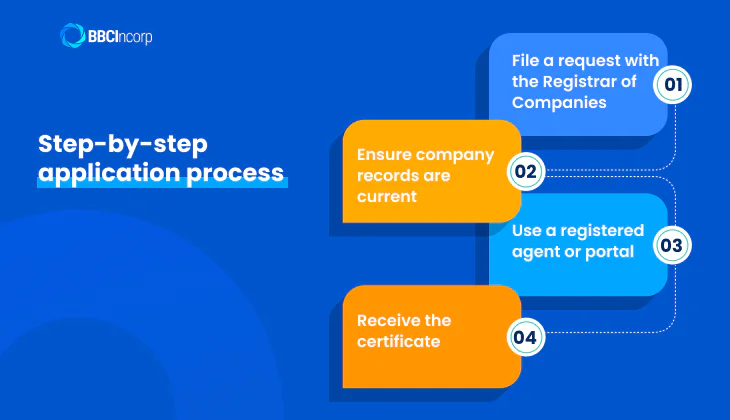
- File a request with the Registrar of Companies: Your registered agent (or authorized principal) submits an application via the Cayman Business Portal (CBP) or the e‑Gov corporate administration portal.
- Ensure company records are current: All annual returns must be filed, government fees paid, and beneficial ownership and Cayman economic substance filings submitted if applicable.
- Use a registered agent or portal: The process is typically handled by your registered agent, but resident companies can apply directly through the online portal.
- Receive the certificate: Assuming all conditions are met, the certificate of good standing Cayman Islands is normally issued within 1 to 3 business days. In special or express cases it may be faster.
Requirements to qualify for the certificate
Not all companies automatically qualify for a certificate of good standing. To be eligible, your entity must meet specific compliance conditions. These include:
- No overdue annual returns or outstanding government fees
- A valid registered office and licensed registered agent on file
- No ongoing legal or regulatory issues that affect the company’s standing
A company may lose good standing if it fails to file annual returns, neglects fee payments, lapses in maintaining a registered office or agent, or becomes subject to legal or regulatory enforcement.
If any of these conditions are unmet, the certificate option will not appear in the CBP portal. In such cases, the registered agent or authorized personnel must contact the Registry to resolve compliance issues before reapplying.
Successfully obtaining a certificate of good standing Cayman Islands confirms that your company is registered, up to date, and in excellent legal standing. Be sure to verify the certificate through the Registry’s verification system using the authorization code and file number provided.
How much does a Cayman Islands certificate of good standing cost?
Understanding the Cayman Islands certificate of good standing fee helps businesses budget properly. Fees can vary depending on the method of application and any additional services required.
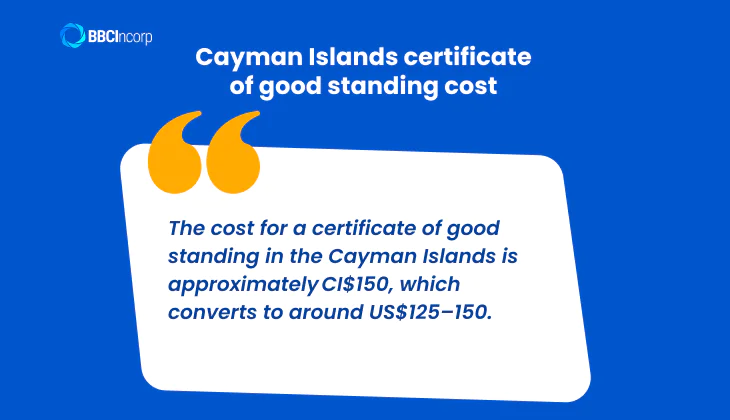
Based on the current fee schedule from the Cayman Islands General Registry effective January 1, 2025, the cost for a standard certificate is approximately CI$150, which converts to around US $125–150. This amount typically covers the government’s processing charge whether your company applies directly or uses a registered agent.
Additional costs that may apply include:
- Certified or notarized copies of the certificate
- Express delivery or courier services for physical documents
- Third‑party handling or convenience fees from registered agents or service providers
Please note that the certificate of good standing Cayman Islands costs can differ slightly depending on the service provider’s markup and any expedited service options they offer.
Fees are subject to change, so it is always wise to confirm with the Cayman Islands General Registry or your corporate services provider before applying.
Some agents may list separate certificate of good standing Cayman Islands fee schedules or bundle options that include certification, apostille, or delivery. Despite these variations, the base government fee often remains in the US $125–150 range.
In summary, budgeting around US $125–150 for the official certificate, plus any optional extras, provides clarity when obtaining a certificate of good standing Cayman Islands. Always verify current charges to avoid surprises and plan for any additional service-related fees.
How to verify a Cayman Islands certificate of good standing
Verifying a certificate of good standing Cayman Islands ensures its authenticity and protects your business from fraud. Here are the most reliable methods:
- Contacting the Cayman Islands General Registry: Use the entity file number and the authorisation code printed on the certificate to check its validity. Visit the government’s verification portal at verify.ky and follow the on‑screen instructions
- Reviewing document serial numbers and official seals: Genuine certificates feature a unique entity file number, a secure authorisation code, the official Registry seal, and an issue date. Compare these against the government portal results.
- Engaging the services of a registered corporate service provider: Agents or corporate service providers licensed in the Cayman Islands routinely verify certificates using their access to the General Registry system.
Verification is especially important for banks, law firms, and regulators who depend on accurate records during due diligence, risk assessments, or compliance reviews. A verified certificate of good standing Cayman Islands verification confirms that the company is current and legally compliant.
Beware of fraudulent documents circulated by unlicensed third parties. These may lack valid authorisation codes or official seals. Always insist on certificates that can be directly verified through the government system or through a licensed provider.
Having a confirmed and authenticated certificate of authentication Cayman Islands safeguards your business by preventing legal risks, transaction delays, or reputational damage.
Conclusion
In summary, the Cayman Islands certificate of good standing is a vital endorsement of your company’s legal compliance and credibility. Essential for entities like exempted companies, SPVs, funds, and firms handling international transactions, this document is typically required in scenarios such as bank account openings, audits, licensing renewals, and mergers.
It is important for business owners to regularly monitor their company’s standing, ensuring all filings and fees remain current, to avoid disruptions. If you are in doubt or need assistance, consider partnering with a reputable registered agent.
For streamlined support in obtaining a certificate of good standing Cayman Islands, you might explore services like BBCIncorp, which offers offshore company formation and compliance management. Maintaining up-to-date documentation reinforces your entity’s global reputation and facilitates seamless operations.
Disclaimer: While BBCIncorp strives to make the information on this website as timely and accurate as possible, the information itself is for reference purposes only. You should not substitute the information provided in this article for competent legal advice. Feel free to contact BBCIncorp’s customer services for advice on your specific cases.
Industry News & Insights
Get helpful tips and info from our newsletter!
Stay in the know and be empowered with our strategic how-tos, resources, and guidelines.





